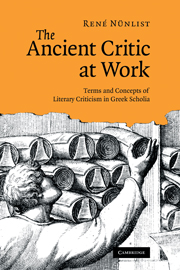Book contents
- Frontmatter
- Contents
- Acknowledgments
- Introduction
- PART I
- 1 Plot
- 2 Time
- 3 Narrative and speech
- 4 Focalisation
- 5 Effects on the reader
- 6 Gaps and omissions
- 7 Poetic licence
- 8 Authentication
- 9 Style
- 10 Allusions, hints, hidden meanings
- 11 Characters
- 12 Mythography
- PART II
- Epilogue
- Glossary of Greek terms
- Editions of scholia
- Other abbreviations
- Bibliography
- Thematic index
- Index locorum
8 - Authentication
Published online by Cambridge University Press: 29 August 2009
- Frontmatter
- Contents
- Acknowledgments
- Introduction
- PART I
- 1 Plot
- 2 Time
- 3 Narrative and speech
- 4 Focalisation
- 5 Effects on the reader
- 6 Gaps and omissions
- 7 Poetic licence
- 8 Authentication
- 9 Style
- 10 Allusions, hints, hidden meanings
- 11 Characters
- 12 Mythography
- PART II
- Epilogue
- Glossary of Greek terms
- Editions of scholia
- Other abbreviations
- Bibliography
- Thematic index
- Index locorum
Summary
The preceding chapter on Poetic Licence has shown that ancient critics were willing to grant poets a considerable amount of freedom, for example with respect to fiction. Another group of scholia makes it clear, however, that poets should not altogether abandon the principle of a story which is probable, plausible and therefore trustworthy. The poet must not lose his reader's trust, and this can be achieved if he authenticates his story.
According to a widely accepted notion, ancient and modern, the best possible source for an authentic report is the eyewitness. The Homeric epics themselves attest to this notion when the still unidentified beggar Odysseus praises Demodocus for his song about the Greek sufferings in the Trojan war (Od. 8.489–91). It is important to note the exact wording in this passage. Demodocus presents his song as if he had been an immediate witness (ὥς τέ που ἢ αὐτὸς παρεών) or relied on one (ἢ ἄλλου ἀκούσας). Odysseus and the Phaeacian audience know that Demodocus had not been on the Trojan battlefield, but his song gives the impression that he had. A similar concept recurs in the scholia.
As several indications in the epics show, the lifetime of the Homeric narrator is considerably later than that of his characters. The scholia are fully aware of this temporal discrepancy and regularly comment that Homer and his characters display differences in lifestyle, technology, habits, etc. (usually focusing on the simple life of Homeric man, see M. Schmidt 1976).
Information
- Type
- Chapter
- Information
- The Ancient Critic at WorkTerms and Concepts of Literary Criticism in Greek Scholia, pp. 185 - 193Publisher: Cambridge University PressPrint publication year: 2009
